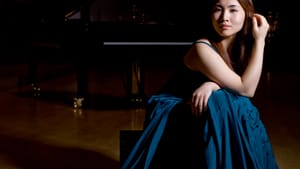Stay in the Loop
BSR publishes on a weekly schedule, with an email newsletter every Wednesday and Thursday morning. There’s no paywall, and subscribing is always free.
Youthful stars and might-have-beens
The Chamber Orchestra of Philadelphia with pianist Di Wu

The conductor of the Chamber Orchestra of Philadelphia, Dirk Brossé, opened the orchestra’s season with a program that stuck to a conventional pattern: a short overture followed by a concerto and a standard symphony. It’s a format that’s become so familiar it’s beginning to feel ritualistic, but Brossé sparked it with two novelties and a concerto performance that paired his taste and energy with a star turn by the guest soloist, pianist Di Wu.
Verdi’s prelude to the third act of La Traviata may be an old friend to opera buffs, but it’s a novelty on orchestra programs. The Chamber Orchestra was playing it for the first time, and I’ve never heard any other orchestra play it. The prelude only lasts about five minutes, but it captures all the romance of the story of the doomed courtesan, starting with its delicate opening passages and ending with a musical evocation of the heroine’s last breaths.
Di Wu is another addition to the parade of high-powered young soloists that has enlivened Chamber Orchestra programs in the last few years. Brossé opened Mendelssohn’s Second Piano Concerto with a big-voiced statement from the orchestra, and Di Wu joined him with a response that sounded simultaneously ringing and reflective. The concerto darts between dash and reflection, and Di Wu played the reflective parts so thoughtfully she created the illusion she was making them up as she sat at the piano. Her third movement sounded less poetic than the other two, but it ended the concerto with a final flourish of speed, grace, and sheer delight in the sonic activity created by the piano and its partners.
Casting a new light
The Chamber Orchestra is poaching on the large orchestra’s territory when it schedules items like Beethoven’s Sixth Symphony, but its performances always cast a new light on familiar terrain. The most obvious difference between the two types of performance is the role of the winds. Modern large orchestras usually contain twice as many string players as the orchestras Beethoven wrote for, but they stick to the number of winds specified in his scores. The Chamber Orchestra pits them against half as many strings, and the winds become more prominent. That was especially important in this concert, as the orchestra trekked through the pastoral landscape of the Sixth, with its evocations of bird songs and shepherd’s pipes.
The other novelty on the program was one of the unlisted “surprises” Brossé likes to drop into his programs. This one was an instrumental prayer for unknown soldiers — a section of a larger work Brossé has composed in commemoration of the 100th anniversary of World War I. It begins solemnly, with a plucked cello providing a drumbeat, but the middle section is gentle and lyrical. I found that odd until I realized it could be heard as a poignant portrayal of all the things the unknowns had missed. It reminded me, in fact, of the final dialogue in Ernest Hemingway’s The Sun Also Rises.
“Oh, Jake,” Brett Ashley says, “we could have had such a damned good time together.”
“Yes,” Jake Barnes says. “Isn't it pretty to think so?”
Brett is talking about the relationship she and Jake will never have because of his war wound, but their dialogue can be applied to larger affairs. We could have had a good time in the 20th century, all of us on Earth together, if our ancestors hadn’t blundered into a military catastrophe and triggered off all the disasters that followed it.
It’s pretty to think so, anyway.
What, When, Where
Chamber Orchestra of Philadelphia: Verdi, Prelude to Act Three of La Traviata. Mendelssohn, Piano Concerto No. 2 in D Minor. Beethoven, Symphony No. 6 in F Major (Pastorale). Di Wu, piano. Chamber Orchestra of Philadelphia, Dirk Brossé, conductor.
September 14, 2014 at the Perelman Theater, Kimmel Center for the Performing Arts, Broad and Spruce Streets, Philadelphia. 215-545-5451 or www.chamberorchestra.org.
Sign up for our newsletter
All of the week's new articles, all in one place. Sign up for the free weekly BSR newsletters, and don't miss a conversation.
 Tom Purdom
Tom Purdom